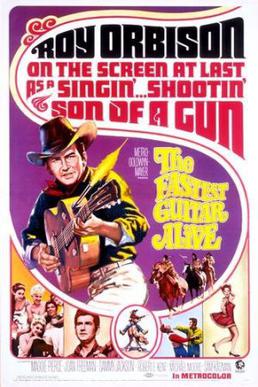Top Qs
Timeline
Chat
Perspective
The Fastest Guitar Alive
1967 film by Michael D. Moore From Wikipedia, the free encyclopedia
Remove ads
The Fastest Guitar Alive is a 1967 American musical comedy Western film directed by Michael D. Moore and starring singer Roy Orbison in his only acting role. The film features Orbison performing seven original songs, which appeared on his 1967 MGM album of the same name. His song "There Won't Be Many Coming Home" is featured in the 2015 western film The Hateful Eight.
Remove ads
Plot
Near the end of the American Civil War, a Southern spy (Orbison) with a bullet-shooting guitar is given the task of robbing gold bullion from the United States Mint in San Francisco to help finance the ill-fated Confederacy's last-ditch war effort.
Cast
- Roy Orbison as Johnny Banner
- Sammy Jackson as Steve Menlo
- Maggie Pierce as Flo Chesnut
- Joan Freeman as Sue Chesnut
- Lyle Bettger as Charlie
- John Doucette as Marshal Max Cooper
- Patricia Donahue as Stella DeWitt
- Ben Cooper as Deputy Rink
- Ben Lessy as Indian Chief
- Douglas Kennedy as Sheriff Joe Stedman
- Iron Eyes Cody as First Indian
- Sam the Sham as First Expressman
Production and release
Filming began September 1966.[1] Although Orbison was pleased with the film, it proved to be a critical and box office flop. While MGM had included five films in his contract, no more were made.[2][3]
Soundtrack
Summarize
Perspective
A soundtrack album for the film was released in June 1967 on MGM Records. It was the only album to consist entirely of Roy Orbison/Bill Dees originals. Its features two single, "There Won't Be Many Coming Home", and "Pistolero". the UK the song chosen as the single for release was "There Won't Be Many Coming Home", and it entered the singles chart there for the week of December 7, 1966, stayed around for nine weeks, peaking at number 12.[8] and entered the Australian chart at its highest position of #15 before slipping down the chart during its eight-weeks stay.[9]
The album was also included in the 2015 box set The MGM Years 1965–1973 – Roy Orbison.[10]
Reception
Richie Unterberger of AllMusic said the album "includes what may be his best obscure tune, the rarely anthologized "Whirlwind." With its galloping rhythm, emotive operatic vocals, swirling strings, and ghostly backing vocals, it recalls the best uptempo ballads that he recorded during his early-'60s heyday at the Monument label."[11]
Billboard described the album as "a pack powerful emotion."[12]
Cashbox identified the album as a "Pop Picks in its review from July 1967, notes "These tunes, in addition to three other Orbison originals, are included"[13]
Track listing
Singles
Remove ads
See also
References
External links
Wikiwand - on
Seamless Wikipedia browsing. On steroids.
Remove ads



